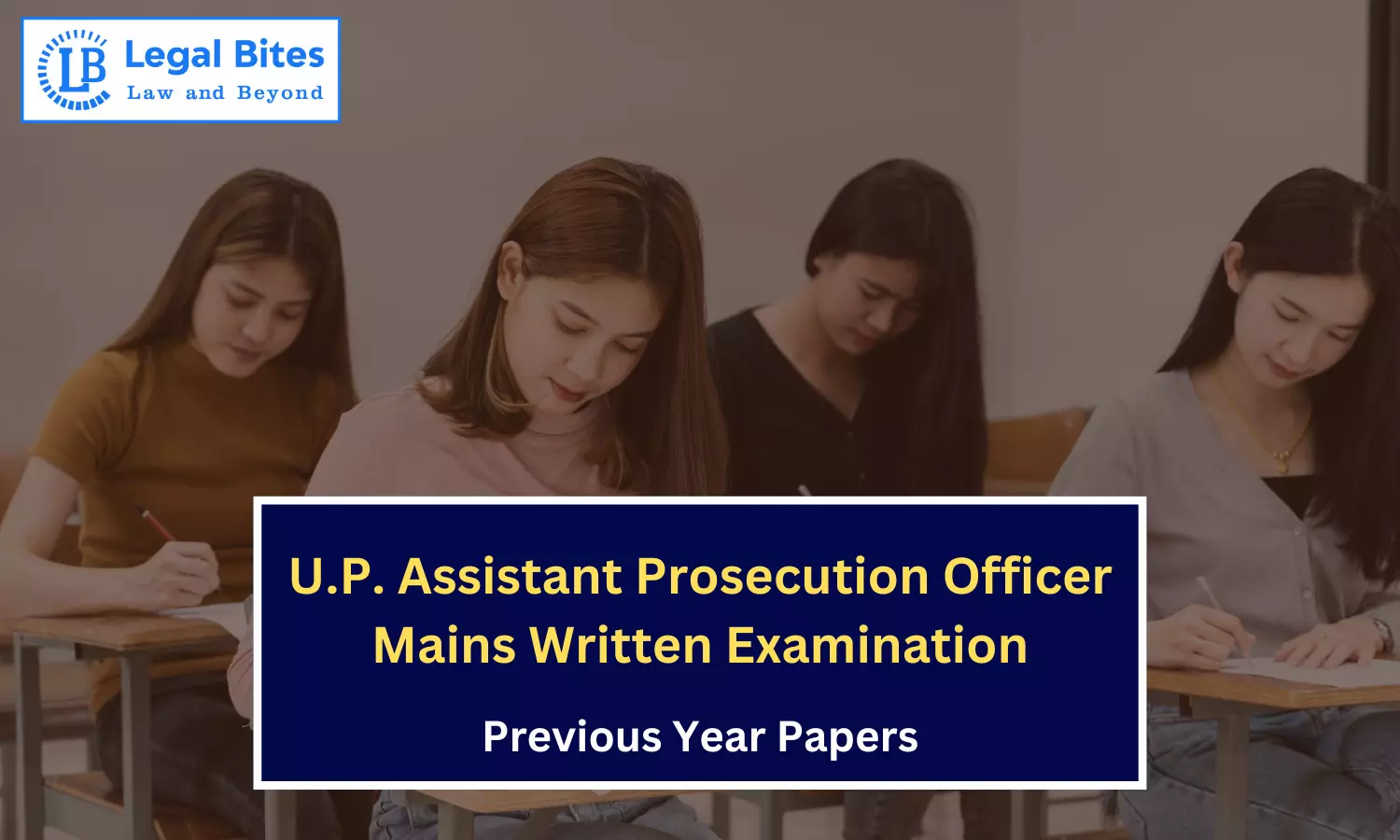U.P. Assistant Prosecution Officer Exam Mains 2015 Previous Year Paper (Criminal Law and Procedure-with Police Act and Regulations)
Candidates preparing for the U.P. Assistant Prosecution Officer Exam should solve the U.P. Assistant Prosecution Officer Exam Mains 2015 (Criminal Law and Procedure-with Police Act and Regulations)

Candidates preparing for the U.P. Assistant Prosecution Officer Exam should solve the U.P. Assistant Prosecution Officer Exam Mains 2015 Previous Year Paper (Criminal Law and Procedure-with Police Act and Regulations) and other previous year question papers. This helps in understanding the syllabus, preparing the subjects effectively, and aligning preparation with the types of questions asked. All successful candidates carefully analyze the tricks and question patterns of the UP APO exam. Aspirants should adopt this approach at the start of their preparation to gain a clear understanding of the question pattern and style.
U.P. Assistant Prosecution Officer Exam Mains 2015 Previous Year Paper (Criminal Law and Procedure - with Police Act and Regulations)
Practising authentic question papers provides a real feel of the exam. Here's the U.P. Assistant Prosecution Officer Exam Mains 2015 Paper (Criminal Law and Procedure - with Police Act and Regulations). Practice and Prepare with our UPPSC APO Mock Test Series. | SPONSORED
U.P. Assistant Prosecution Officer Mains Written Examination 2015
(Law of Evidence Criminal Law and Procedure - with Police Act and Regulations)
(Law of Evidence Criminal Law and Procedure - with Police Act and Regulations)
(i) Attempt five questions in all. Attempt to answer any two questions from Parts A and B. Question no. 1 is compulsory.
(ii) All Parts of each question carry marks as indicated at the end of the respective part.
Question 1
(a) Discuss briefly the distinction between the procedure of investigation by a police officer in cognizable and non-cognizable offences. (10 Marks)
(b) Discuss the procedure of investigation by police in cases of suicide or suspected death of victims. (5 Marks)
(c) In what circumstances may a police officer arrest a person without an order from the Magistrate? Explain it with an example. (5 Marks)
Part - 'A'
Question 2
Write short notes on the following:
(a) Criminal trespass (6 Marks)
(b) Dowry death (8 Marks)
(c) House-breaking (6 Marks)
Question 3
(a) A entered the house of B with the intention of committing theft. B and other members of his family surrounded A and attacked with Lathis. Finding his life in danger, A whipped out a revolver and fired causing the death of B. Is A guilty of murder under Section 302 of the Indian Penal Code? (5 Marks)
(b) A instigates B to give false evidence. B does not give false evidence. Has A committed any offence? Discuss. (5 Marks)
(c) A enters by night a house, which he is legally entitled to enter. B in good faith taking A for house-breaker, attacks A. Whether A has right to private defence against B? (5 Marks)
(d) On receiving consideration of 10,000, A agreed to supply D with tools so that he could derail a Kolkata-bound train. A supplied the tools to B. What offence has A committed? (5 Marks)
Question 4
(a) State the construction of reference to sentence of transportation for life under Section 53-A of the Indian Peal Code, 1860. (8 Marks)
(b) Describe the exceptions in which culpable homicide does not amount to murder. (6 Marks)
(c) Whether a criminal appeal can be dismissed without considering the merits on the ground of absence of appellant? State with reasons. (6 Marks)
Question 5
(a) Whether any member of an unlawful assembly is guilty of an offence which is committed in prosecution of the common object? Why? (10 Marks)
(b) What legal pleas are offered to a person charged with defamation? (10 Marks)
PART- B
Question 6
(a) Give a brief description of the procedure to be adopted under Section 145 of Code of Criminal Procedure regarding to disputes relating to immovable property. (10 Marks)
(b) When can bail be granted in case of a non-bailable offence? Can bail be granted subject to conditions? (10 Marks)
Question 7
(a) What do you understand by summary trial? What offences may be tried summarily and by whom? (8 Marks)
(b) Under what circumstances can a police officer arrest a person without warrant? (6 Marks)
(c) Describe the law and procedure for maintenance of wife, children and parents in Criminal Procedure Code. (6 Marks)
Question 8
(a) Distinguish between Police Report and First Information Report. (6 Marks)
(b) What are the grounds of revision according to Criminal Procedure Code? (6 Marks)
(c) What are the provisions regarding search by a police officer under the Criminal Procedure Code, 1973? Explain. (8 Marks)
Question 9
(a) What are the provisions under Criminal Procedure Code for the investigation which is not completed within 24 hours? (10 Marks)
(b) "Crime is a revolt against the whole society and an attack on the civilization of the day." Elucidate and discuss the essential elements of crime. (10 Marks)


